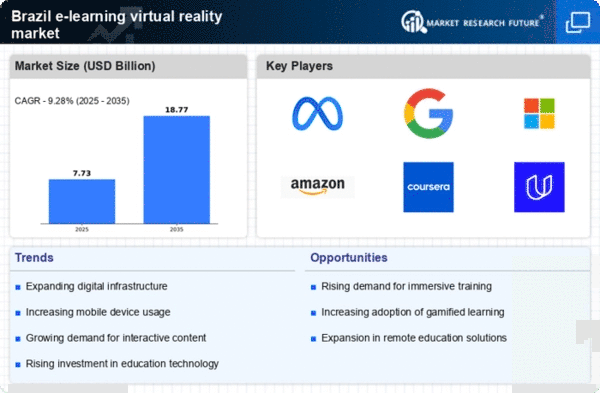Growing Investment in EdTech Startups
The e learning-virtual-reality market in Brazil is experiencing a surge in investment in EdTech startups. Venture capitalists and private equity firms are increasingly recognizing the potential of VR technologies to transform education. This influx of capital is enabling startups to develop innovative solutions that enhance learning experiences through immersive technologies. As a result, the e learning-virtual-reality market is likely to see a proliferation of new products and services aimed at improving educational outcomes. Recent reports indicate that investment in Brazilian EdTech startups has increased by over 50% in the last year, highlighting the growing interest in leveraging technology to address educational challenges. This trend is expected to drive further growth in the e learning-virtual-reality market.
Technological Advancements in VR Hardware
Technological advancements in VR hardware are playing a crucial role in shaping the e learning-virtual-reality market in Brazil. The development of more affordable and user-friendly VR devices has made it easier for educational institutions to integrate these technologies into their curricula. Enhanced graphics, improved motion tracking, and wireless capabilities are making VR experiences more accessible and enjoyable for students. As the cost of VR headsets continues to decline, it is anticipated that more schools and universities will invest in these tools. This trend is expected to contribute to a projected market growth of around 30% by 2026, as institutions seek to leverage cutting-edge technology to enhance educational outcomes in the e learning-virtual-reality market.
Emphasis on Skill Development and Training
The e learning-virtual-reality market in Brazil is increasingly emphasizing skill development and training programs. As industries evolve and the job market becomes more competitive, there is a growing need for effective training solutions that can equip individuals with the necessary skills. VR technology offers a unique opportunity to create realistic training simulations that enhance learning outcomes. Companies and educational institutions are recognizing the value of immersive training experiences, leading to a rise in demand for VR-based skill development programs. This trend is expected to contribute to the expansion of the e learning-virtual-reality market, with projections indicating a potential growth rate of 20% over the next few years as organizations seek to invest in innovative training solutions.
Increased Focus on Remote Learning Solutions
The e learning-virtual-reality market in Brazil is witnessing an increased focus on remote learning solutions. As educational institutions adapt to changing learning environments, the integration of VR technology into remote learning platforms is becoming more prevalent. This shift is driven by the need to provide students with immersive learning experiences that can be accessed from home. The e learning-virtual-reality market is likely to benefit from this trend, as institutions seek to maintain engagement and interactivity in virtual classrooms. Recent studies indicate that the demand for remote learning solutions has risen by approximately 40% in the past year, suggesting a strong potential for growth in the e learning-virtual-reality market as more institutions explore innovative ways to deliver education.
Rising Demand for Interactive Learning Experiences
The e learning-virtual-reality market in Brazil is experiencing a notable surge in demand for interactive learning experiences. This trend is driven by the increasing recognition of the effectiveness of immersive technologies in enhancing student engagement and retention. Educational institutions are increasingly adopting virtual reality (VR) tools to create dynamic learning environments that cater to diverse learning styles. According to recent data, the market is projected to grow at a CAGR of approximately 25% over the next five years. This growth is indicative of a broader shift towards experiential learning, where students can interact with content in a more meaningful way. As a result, the e learning-virtual-reality market is likely to expand significantly, attracting investments from both public and private sectors in Brazil.
















